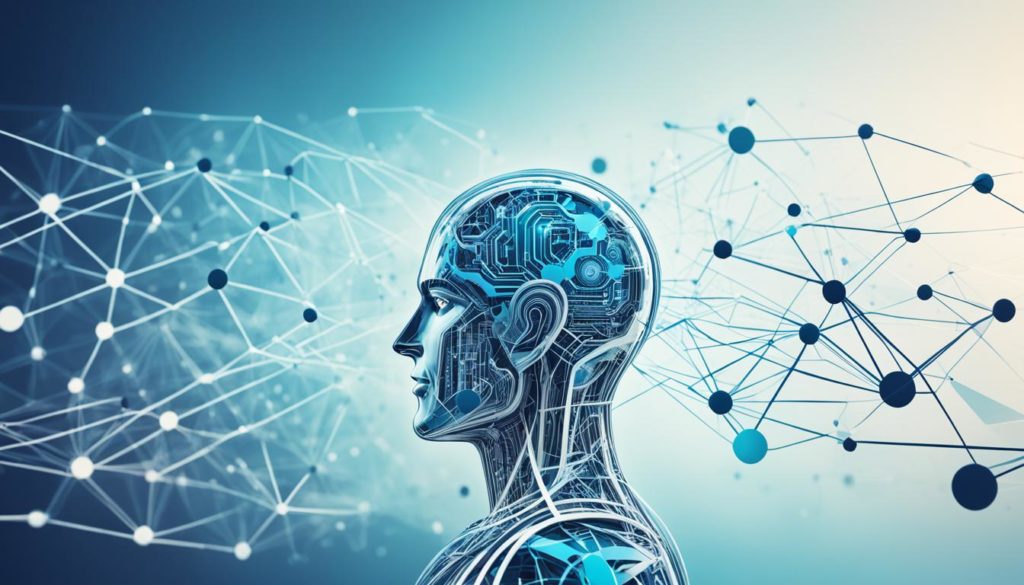
AI integration is changing how companies work, becoming key in digital overhauls. Big or small, businesses are tapping into AI, making smart tech available for all. By using AI smartly, operations across industries are becoming better and more efficient.
Today, companies use AI to boost how well they work, improve customer service, and shift to digital ways. Making AI work isn’t just about new tools. It’s about thinking how a digital future can reshape a company. With predictive analytics and AI-run systems, businesses better manage their resources and cut down on downtime.
Key Takeaways
- AI is changing how businesses run, becoming central in digital changes.
- From big to small, enterprises are using AI, making advanced tech available for everyone.
- Smart AI use bridges gaps in operations, affecting change across the board.
- By AI using predictive analytics, decisions get a step ahead, spotting market trends early.
- AI promotes ongoing learning and teamwork.
AI is clearly powerful in making processes better, pushing for innovation in every sector. With AI-focused transformation methods, businesses use predictive analytics to see the future trends and understand clients better. This sharpens how they make decisions.
AI offers great new opportunities for businesses to connect with customers. For instance, AI chatbots and virtual help are lowering response times, making customers happier.
In this modern time, AI means innovation. It tackles change and strengthens us against challenges. Clearly, artificial intelligence isn’t just change, it’s a revolution that’s reshaping business everywhere.
Understanding AI and Digital Transformation
Artificial intelligence (AI) is changing the digital world significantly. It’s key to making digital transformations work. The artificial intelligence impact changes how we handle data, make choices, and interact with people. With AI, businesses can work more efficiently and come up with new ideas.
Defining Artificial Intelligence
AI means computers can do tasks that need human-like smartness. This includes things like understanding what’s in a picture, analyzing speech, and making choices. AI uses machine learning, natural language processing, and computer sight. It lets companies make tasks automatic, making work smoother. This helps focus on important actions that can grow the business.
Overview of Digital Transformation
Digital transformation fully uses digital tech in all parts of a business. This changes how the company works and delivers value. It’s not only about tech; it also changes the company’s culture. Companies have to rethink how they connect with customers, their business model, and how they innovate. AI plays a vital role here. It helps to improve how companies talk with customers and make better decisions using data.
AI is key in this change, making products get to market faster. It also helps find and fix problems before they happen. AI makes simulations to help in making choices. The good things about AI in digital are better data studies, more profits, and knowing what customers want. As more companies use AI, business is getting smarter and more efficient.
But, there are hurdles when using AI in digital change. Issues like data privacy and the need for more skilled workers can slow things down. Overcoming these issues is important. It lets businesses use AI fully to move their digital change plans ahead.
Key Benefits of Leveraging AI for Digital Transformation
Artificial Intelligence (AI) is changing how we digitally transform our world. It brings big benefits to three main areas: better data analysis, making customers happier, and improving our work processes.
Advanced Data Analytics
AI has a huge role in letting us do more with our data. It can quickly go through tons of data to find important patterns or strange things. This helps companies know what’s happening and make smarter choices.
Enhanced Customer Experience
AI also helps companies do more for their customers. Robots that chat with you online or tools that recommend what you might like can make your experience more personal. This can make people more satisfied and loyal to the company.
Process Automation and Efficiency
AI doesn’t just help customers; it also makes our work lives easier. It can do the boring jobs for us, like filling out forms. This makes work faster, with fewer mistakes, and it can even save a lot of money. The power of AI in these tasks is in its ability to learn and improve over time.
Challenges and Ethical Considerations
Bringing automation tech into digital changes comes with big hurdles and ethical questions. Companies must be careful. They need to keep their data all right and follow new privacy rules. A deal between the US and UK shows we need to develop AI responsibly in our businesses.
Data Quality and Privacy
By using strong data rules and making data anonymous, companies can keep private info safe and win people’s trust. It’s very important to update old systems and fight off cyber attacks to keep data reliable. Keeping up with rules like GDPR is key for businesses. It helps solve privacy concerns with AI.
Addressing Ethical AI Concerns
Putting AI into practice ethically means creating rules that fight biases and encourage being fair, answerable, and clear. When using AI in marketing, worries around how customer data is collected and used are real. But using AI right also makes a brand look good and builds trust.
Companies should think about how automation might take away jobs. It’s vital to invest in teaching employees new skills to lessen this effect. Also, letting AI experts and business teams work together will boost new ideas. This way, using AI becomes easier while keeping ethical values top.
When setting up AI, we need frameworks that tell us how to be ethical and what rules to obey. Making and following these rules is key. It ensures AI helps but doesn’t harm, as tech changes up industries. Ongoing study and teamwork help us get AI right and use it responsibly.
| Challenge | Solution |
|---|---|
| Data Quality and Privacy | Implementing rigorous data governance and anonymization techniques |
| Addressing AI Bias | Establishing frameworks to promote fairness, accountability, and transparency |
| Job Displacement | Investing in employee retraining and adaptability programs |
| Regulatory Compliance | Complying with data protection regulations like GDPR |
| Ethical Data Use | Ensuring responsible collection, storage, and usage of consumer data |
AI in Digital Transformation
AI is making digital change happen. It helps every business, big or small, to be more inventive and efficient. This change makes tech tools available to more people, improving how things get done and how customers are reached.
AI boosts new ways to make smart moves. With AI, business owners and developers can guess what’s next using predictive skills. This means companies can keep up and win in a changing cyber world.
For digital change to work, knowing how it affects us is key. AI helps us guess what customers want and tweak our work to match. It’s about using data to make choices that bring better results.
AI’s role in change makes it a key part, ensuring that businesses do more than just keep up. They lead in using tech to their advantage.
Best Practices for AI Implementation in Digital Transformation
Adding AI to digital change can boost how a business runs and its results. But to get the best out of AI, following AI implementation best practices is key. It’s also important to build up AI skills within your team.
Define Clear Objectives
First, make sure you know what you want to achieve with AI. This should be tied to your big business goals. Setting clear, measurable goals will help track your progress. Without these, your AI efforts could be all over the place.
Build a Robust Data Infrastructure
A solid, adaptable data setup is crucial for successful AI. Make sure your data is clean and ready for AI. This means managing data well, finding good storage, and having fast data processing.
This good data foundation makes it easier to mix AI into your systems. It helps you make better decisions too.
Foster Collaboration
AI needs team effort to really work. It’s key to work closely with data experts, IT, and business people. This builds a sharing, problem-solving, and innovative culture.
Keep training your teams so they get better with AI. This supports an environment ready for AI changes. And it keeps your team sharp.
And take AI step by step, from trials to full use. Change management is crucial. It helps your team accept new AI tech. This builds a culture that always looks to improve and adapt.
Conclusion
We have seen how AI is leading us into a new phase of innovation. It’s helping businesses do more with less, leading to better operations.
Transforming with AI is a big step. It requires both investment and a skilled workforce. But the outcome is worth it. With AI, organizations can work smarter, faster, and better meet the needs of their customers.
Yet, adopting AI comes with its own set of challenges. There are concerns over privacy and not enough people with AI skills. But, by handling data carefully and using AI ethically, these hurdles can be overcome.
Moving forward, making AI a central part of our digital strategies is key. It helps us keep up in a rapidly changing tech world. Our journey towards digital transformation promises many benefits in the long run.
FAQ
What is AI in digital transformation?
AI in digital transformation means using artificial intelligence to boost a company’s change into a more digital state. It helps make operations smoother, customer experiences better, and business models more creative. AI, like machine learning and data analytics, enables smart decision-making and process automation. This improves how productive and cost-effective a business can be.
How does AI impact digital transformation strategies?
AI deeply impacts how digital transformation works. It lets companies use data analytics in AI to understand trends and offer unique customer experiences. With the help of automation, tasks can be done faster and with fewer errors. This makes operations more efficient and boosts competitiveness in the digital world.
What are the key benefits of using AI in digital transformation?
Using AI in the digital shift brings several advantages. These include smarter data analytics for better decisions, chatbots for personalized customer interactions, and automation to speed up tasks. Such benefits significantly amp up a company’s productivity and service quality.
What challenges should organizations be aware of when implementing AI?
When putting AI into play, organizations face certain challenges. There’s a need to keep data clean and private, avoid biases in AI, and stay updated on privacy laws. Tackling these requires thorough data policies, ethical AI use, and a clear plan for privacy and fairness.
How can organizations ensure ethical deployment of AI?
Making AI use ethical means setting up fair, transparent, and accountable rules. This involves ensuring AI operates without bias, respecting privacy, and complying with laws. It’s about cultivating a responsible AI environment throughout the organization.
What are the best practices for AI implementation in digital transformation?
For a successful AI launch, start by setting clear goals that match your business needs. Then, make sure your data setup is strong and flexible. Collaboration among different parts of your company is key. Aim to start small and grow your AI use carefully, alongside training and managing change well.
How can AI enhance customer experiences?
AI makes customer experiences better by offering personalized help. Think of chatbots giving quick answers and suggesting items a person might like. Such personal touches can greatly increase customer happiness and loyalty.
How does AI contribute to process automation?
AI makes operations smoother by handling repetitive tasks with a smart touch. This cuts down on mistakes, saves a lot of time, and makes things cheaper to do. With AI doing the routine, people can focus on work that needs a human touch, increasing overall productivity.
Why is a robust data infrastructure essential for AI implementation?
Good data systems are vital for AI to work well. They ensure data is clean, unified, and ready for analysis. With a solid base, AI tools can provide insights that improve decision-making and foster innovation.
How important is collaboration in AI-driven digital transformation?
Teamwork is key in a digital transformation powered by AI. Joining forces across different parts of a company makes sure AI fits well with everything else. This joint effort leads to new ideas, better solutions, and AI that helps everyone achieve common goals more effectively.
Future App Studios is an award-winning software development & outsourcing company. Our team of experts is ready to craft the solution your company needs.










